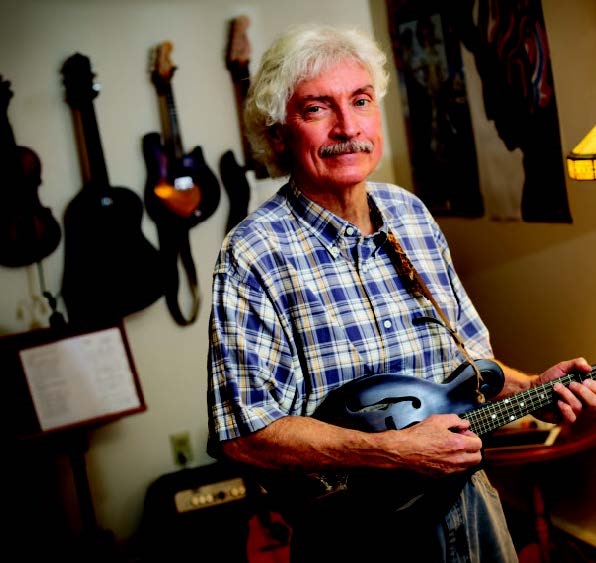“When I first got out of the hospital, I couldn’t even lift a gallon of milk. Now, I’m walking, doing yoga and playing in my band”

Thanks to an anonymous donor, Douglas Delahanty received two new organs—a heart and a kidney—one year ago at Newark Beth Israel Medical Center. As a result of these gifts, the 65-year-old is loving life once more. He’s painting canvases and writing songs again. He’s playing the mandolin in a band called Mulligan Stew.
For many years, though, Douglas neglected his creative side as he battled medical issues. At the age of 45, he’d suffered a stroke and congestive heart failure. And though he recovered from the stroke, his cardiac function declined.
A normal ejection fraction—the measurement of blood flowing out of the heart’s ventricles—is 60 percent.
“Ten years ago, mine was 35,” says Douglas.
Blood tests revealed that his level of creatinine, a marker of kidney function, was abnormally high, indicating kidney failure.
In 2016, medical issues forced Douglas to quit his job as a house painter.
“I was short of breath and couldn’t do any physical labor,” he recalls.
It Takes a Team
As his condition deteriorated, Douglas learned he would need a kidney transplant. He was happy to find that his sister was a perfect match.
Prior to scheduling surgery, however, he was referred for cardiac clearance to the Cardiothoracic Transplantation Program at Newark Beth Israel Medical Center (NBI).
The news wasn’t good. An echocardiogram showed Douglas’s cardiac function was at 10 percent. Because of his renal failure, certain treatment options were not available to him. He needed a double organ transplant: replacing the diseased heart and kidney with healthy ones from a single organ donor.
Douglas was game.
“The doctors felt confident about surgery, so I did too,” he says. First, he had to undergo medical and psychosocial screening tests. He became educated about financial considerations as well as the overall transplant process.
“The transplant team is a complex, multidisciplinary group,” says Margarita Camacho, MD, Surgical Director of the Heart Transplant Program. Nearly 70 specialists at NBI—from physicians and surgeons to nurses, social workers, therapists, pharmacists, dietitians and office staff—are required to assist patients pre-and post-surgery.
The Advanced Heart Failure Treatment and Transplant Program at Newark Beth Israel Medical Center (NBI) is one of only a dozen centers in the nation that has performed more than 1,100 heart transplants and is ranked among the top 15 programs in the country.
His was not a common surgery. “About 50 to 60 heart-kidney transplants are done in the U.S. each year,” Dr. Camacho says.
“Newark Beth Israel does three to six of those.”
New Heart, New Kidney
Once Douglas was deemed a good candidate, he was placed on the New Jersey Sharing Network list. He was fortunate to receive a call about a match within months.
On August 6, 2017, Douglas received his heart and kidney transplants. The heart surgery is performed first, followed by kidney surgery. When Douglas woke up in the Intensive Care Unit after the time-intensive surgery, his sister and friends were there waiting.
He remained in the hospital for three and a half weeks, observed closely by his medical team, who monitored immunosuppressive drugs and possible complications. Today, he visits the transplant program for tests once a year.
“When I first got out of the hospital, I couldn’t even lift a gallon of milk. Now, I’m walking, doing yoga and playing in my band,” says Douglas, who is now 50 pounds lighter and working as a delivery van driver.
He plans to keep working until he’s 70.
Why?
“Because I can.”
To learn more about heart care and transplant services and kidney transplant services at Newark Beth Israel Medical Center, contact us for an appointment or call (888) 724-7123.